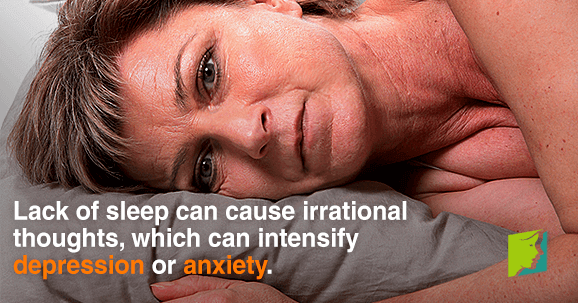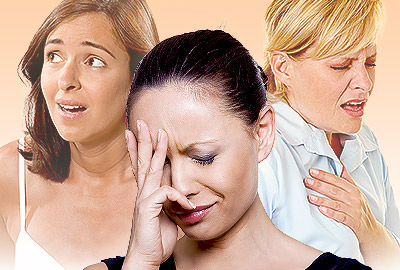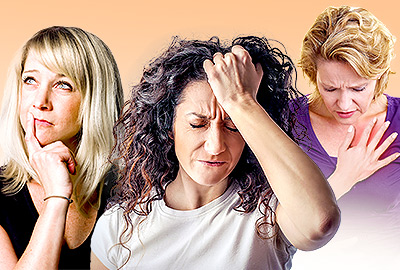Many women report feelings of depression and anxiety as they transition through menopause. Several factors are to blame for this, not least the hormonal fluctuations of this life stage. These conditions can manifest in different ways with varying levels of severity. While some will simply feel a little bit more anxious than usual, other women can have symptoms that snowball into clinical conditions. Lifestyle changes can prevent this, so dealing with anxiety and depression as soon as they arise is important. Keep reading to learn ways of dealing with these common symptoms of menopause.
What Are Anxiety and Depression?
Depression is a chronic feeling of sadness and hopelessness. These feelings can often occur for no apparent reason, and symptoms are similar to sadness caused by grief or illness (such as an underactive thyroid). Depression can make daily life seem impossible, and even the simplest of tasks can seem exhausting. Menopausal depression induces:
- Fatigue or loss of energy
- Feelings of worthlessness
- Trouble thinking or concentrating
Anxiety is of a similar ilk to depression, usually arising from the same sources, and is defined as a feeling of unease, such as worry or fear. This feeling can arise from the depressive feelings, but anxiety itself could also be triggering low moods and depression. A few of the symptoms associated with anxiety are:
- Chronic feeling of unease or dread
- Irritability
- Palpitations
What Are the Causes of Anxiety and Depression?
Menopause is a big change in a woman's life and can cause depression and anxiety for a number of reasons, outlined below:
Progesterone deficiency. Fluctuations in hormone levels can lead to periods of progesterone deficiency. Tests have shown that progesterone has a calming effect on the body, and so having too little of this hormone can make a woman more vulnerable to developing anxiety disorders.
Other menopausal symptoms. Other symptoms of menopause (e.g., hot flashes, sleep problems, and vaginal dryness) have an effect on overall well-being and can be the source of a low mood and anxiety.
Negative outlook. Feeling negative about menopause and getting older can take its toll on a woman's mental well-being. Likewise, fears for the future can induce stress and lead to anxious feelings.
How to Deal with Anxiety and Depression
Here are some tips to help you deal with these symptoms:
Get enough sleep. Lack of sleep can cause irrational thoughts, which can intensify depression or anxiety. Promote good sleeping patterns by making your bedroom cool, dark, and quiet and by going to bed at roughly the same time every night.
Regular exercise. Exercise encourages the release of serotonin and endorphins, which are neurotransmitters that act as natural mood enhancers. Adults up to 64 years of age should be doing around 20 - 30 minutes of moderate intensity exercise every day - anything that increases heart and breathing rates - but any exercise is better than none. Cycling, swimming, walking, or gardening are all possible antidotes to negative feelings.
Try an herbal remedy. St John's wort (Hypericum perforatum) and valerian (Valeriana officinalis) have been shown to reduce anxiety and elevate mood. St John's wort is thought to prolong the action of serotonin in the brain, and valerian contains substances that have a relaxant effect.
Alternative therapies. Slow breathing techniques are beneficial as they help decrease blood pressure, pulse, and respiration rate. Yoga and mindfulness can promote calmness and help cope with stressors at hand. Alternatively, you may also take advantage of the positive effects of foot reflexology on depression and stress during menopause.
With all the internal and external changes occurring to menopausal women, it is no surprise that anxiety and depression are common symptoms. Implementing simple lifestyle changes, however, means that the distressing psychological and physical symptoms should decrease, leading to a better sense of overall well-being.
For further information on dealing with anxiety during menopause click here.
Sources
- Anxiety UK. (2014). Guide to herbal medicines. Retrieved July 22, 2014, from https://www.anxietyuk.org.uk/get-help/get-help-3/guide-to-herbal-medicine
- Anxiety UK. (2014). Physical exercise and anxiety. Retrieved July 22, 2014, from https://www.anxietyuk.org.uk/get-help/get-help-3/physical-exercise-and-anxiety
- National Health Service UK. (2012). Clinical depression. Retrieved July 22, 2014, from http://www.nhs.uk/Conditions/Depression/Pages/Introduction.aspx
- Toriizuka, K. , Mizowaki, M. & Hanawa, T. (2000). [Menopause and anxiety: focus on steroidal hormones and GABAA receptor]. Nihon yakurigaku zasshi, 115(1), 21-28. Retrieved from http://www.ncbi.nlm.nih.gov/pubmed/10876812
- University of Maryland Medical Center. (2013). Depression. Retrieved July 22, 2014, from http://umm.edu/health/medical/altmed/condition/depression




